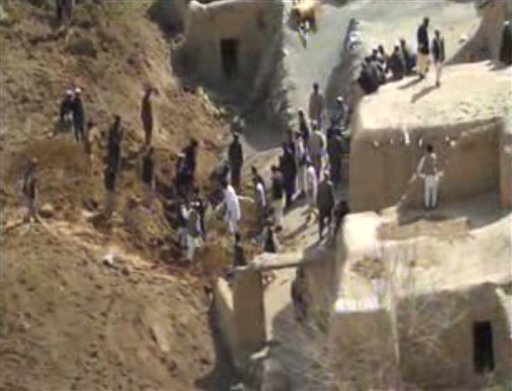Afghan rescuers and hundreds of volunteers armed with shovels rushed on Saturday to help villagers hit by a massive landslide in the remote northeast a day earlier, officials said, while fears of a new torrent of mud and earth complicated rescue efforts.
Figures on the number of people killed in the disaster varied as officials try to gather precise information from the village of Hobo Barak.
Abdullah Homayun Dehqan, the director of Badakshan province’s National Disaster Department, said he did not have an exact number of how many people were killed. The United Nations on Friday said at least 350 people died, and the provincial governor said as many as 2,000 people were feared missing.
Afghanistan deputy director of the Natural Disaster Management Authority, Mohammad Aslam Seyas, said Saturday that 255 people had died. He said villagers believe the number is higher, but said judging by previous experiences that the 255 figure seems more realistic.
“Search and rescue operations are going on very slowly,” Seyas said, adding that fear of new landslides had slowed the operation.
Friday’s damage was actually caused by two landslides from the hilly terrain, said Dehqan. The first, smaller one covered a few houses. When people rushed in to help, a second, bigger landslide came down, burying the rescuers and more houses, he said.
Another official with the authority, Ahmad Khan Nafeh, said initial reports suggest that 120 houses had been buried under the mud. Speaking on Afghan television, he said he did not have any information on the number killed or missing but said it was unlikely that anyone buried underneath would be found alive.
“I don’t think any human who would have been buried under all that mud for more than 12 hours or so, would have been alive,” he said.
Authorities were distributing food and water to people displaced by the landslides, said Dehqan.
A memorial ceremony is planned for later Saturday, and the site is expected to be designated as a mass grave, said U.N. spokesman Ari Gaitanis. Senior officials from Kabul including one of the country’s two vice presidents were flying to Badakshan province to check on the status of the operation.
Rescuers have struggled to reach the remote area in northeastern Afghanistan, where there is little development or infrastructure. Heavy rains earlier this week contributed to the landslide.
In addition to the wars and fighting that have plagued Afghanistan for roughly three decades, the country has been subject to repeated natural disasters including landslides and avalanches. A landslide in 2012 killed 71 people. Authorities were not able to recover the vast majority of bodies and ended up declaring the site a massive grave.
Source: UNBConnect









